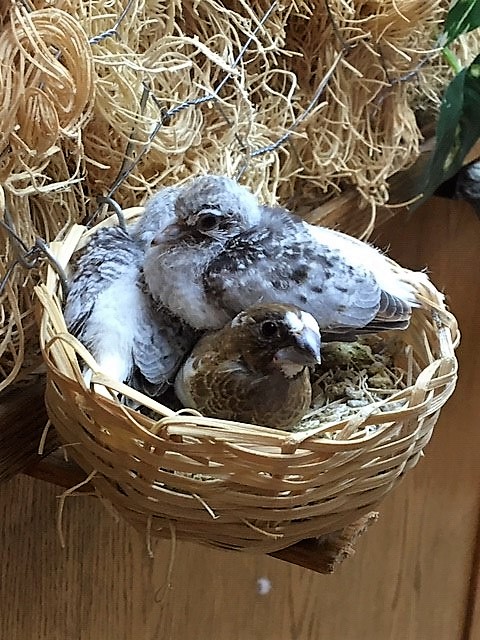Society in a peace loving world – A pair of Diamondback doves proudly hatched twins recently in the Shorehaven first floor aviary. The nest was perfectly designed and the babies hatched healthy, hungry and strong. Residents adored the fluffy wayward pair, as the youngins’ represented newness and hope in a raging worldwide pandemic.

But then things began to change. Mama bird soon grew fatigued in the constant feeding and caring for her babies. She was looking a bit haggard. And then a convenient stranger flew in to assist.
The Society finch is known for its nurturing behavior, often mothering abandoned birds and occasionally joining a nest to “nanny” others’ fledglings. The finch shares the aviary with the doves, observed the mama’s antics, and readily flew in to the rescue.
“They’re the neatest birds,” said longtime aviary assistant JoAnn Theeringer. “They take care of everybody and everything. It’s as if they know when and how to help.”
Theeringer said the doves accept the nanny help, because “They are a peace loving bird. They welcome new friendships.” Mama dove will even feed her babies, leaning over the ducked head of the Society finch. “Admittedly, this tiny nest will become overcrowded,” laughed Theeringer, who has been tending Shorehaven aviaries for more than 20 years.
“We wanted to create an aviary setting where birds mingled, were never aggressive, and helped build a culture of peace,” Theeringer noted. “I think this nanny example proves that it worked.”
Just a tidbit
Society Finch Behavior
The Society Finch is one of the most peaceful of the finches. They are social with others of their own species as well as other finch species. They are rarely aggressive and will be the first to back down if confronted by another, more aggressive finch. Because the Society Finch is so tolerant of others, they do well housed with other species and are often used as foster parents for other finch species.








